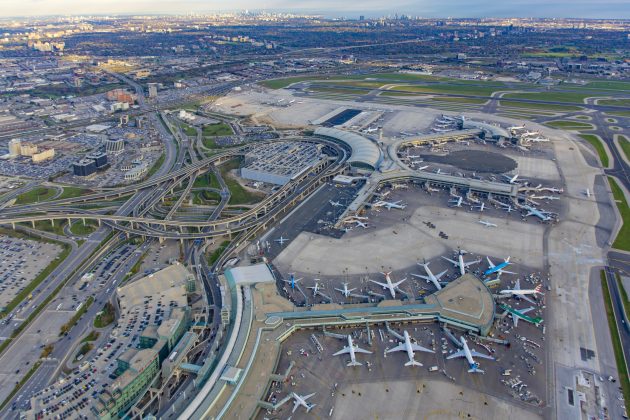
Toronto Pearson wins environment award for 60% reduction in Greenhouse Gas emissions
by CM Staff

Pearson is one of five airports recognized by Airports Council International – North America

Toronto Pearson International Airport (PHOTO: Greater Toronto Airports Authority)
TORONTO — The Greater Toronto Airports Authority (GTAA) is being recognized for its efforts to reduce Greenhouse Gas (GHG) emissions. The manager and operator of Toronto Pearson International Airport has been awarded a 2020 Environmental Achievement Award in the Environmental Management Category from Airport Council International-North America (ACI-NA) for its “20/2020” Sustainability Strategy, which was developed in 2009 with the goal of reducing GHG emissions by 20% (from 2006 levels) by 2020.
As of the end of 2019, the GTAA had reduced Scope 1 & 2 emissions by almost 60% versus a 2006 baseline, with approximately 30% of these reductions coming from GTAA operational changes and innovations and the other 30% attributed to the cleaning of the provincial power supply.
“We’re extremely proud of the results we’ve seen from our Sustainability Strategy,” said Todd Ernst, director of Aviation Infrastructure, Energy and Environment at the GTAA, in a prepared statement. “In 2009, the impact of climate change was becoming increasingly clear. We moved proactively to find ways of reducing energy consumption and associated GHG emissions. We believed then, as we do today, that it is our responsibility, as Canada’s largest airport and a leading global mega hub, to make a meaningful contribution in this area.”
The GTAA has undertaken initiatives to reduce GHG emissions as part of the 20/2020 plan, including:
- providing pre-conditioned air and ground power to aircraft to prevent the use of jet fuel while parked at the gate;
- replacing metal halide lights with LEDs and installing energy-efficient variable-speed drives for its baggage systems;
- installing 32 Electric Vehicle (EV) charging stations in the parking garages of both terminals and in a cellphone lot for people waiting to pick up arriving passengers;
- installing 80 chargers airside for use by electric baggage tugs and other service vehicles;
- introducing two electric shuttle buses for passengers in 2019, with plans to add three more as existing gas vehicles are retired; and
- implementing Airport Collaborative Decision Making, which helps to shorten taxi times and eliminate unnecessary idling as aircraft wait to access gates or the deicing facility, translating into lower fuel consumption and reduced GHG emissions.
A virtual awards presentation will take place on Aug. 26.